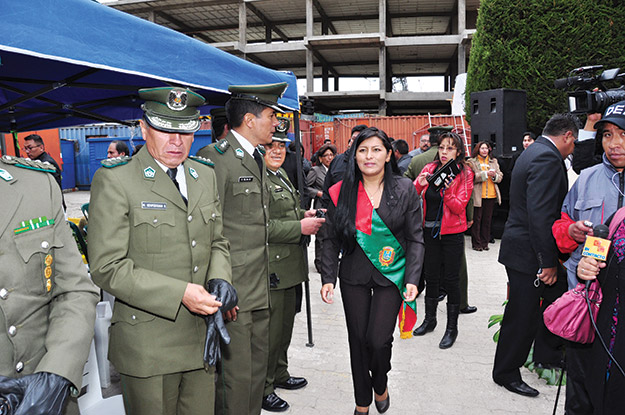This article is adapted from AQ’s most recent issue, “Fixing Brazil,” and has been updated. To see the rest of our Top 5, click here.
When Soledad Chapetón beat an incumbent in 2015 to become the first female mayor of El Alto, Bolivia, she dealt a blow to the political establishment in what many consider Bolivia’s most politically influential city. The city of roughly 1 million, mostly indigenous residents was critical to President Evo Morales’s rise a decade ago, helping the Movement Toward Socialism (MAS) party secure a comfortable hold on El Alto’s politics.
Until Chapetón came along. In March 2015, the political activist and media personality from the National Unity party unseated MAS’s mayor, Edgar Patana, by a two-to-one margin in her second try for the office. La Sole, as her admirers call her, made tackling entrenched corruption in El Alto a key plank in her platform. The mayor’s office, she told AQ, should “benefit all Alteños, and not just the upper echelons.” It was no coincidence, perhaps, that Patana was arrested just months after her victory on allegations of graft.
But for Chapetón, 35, fighting corruption is only a first step toward a larger goal. In her first year, she’s implemented programs targeting the city’s chaotic traffic and has cracked down on unregulated bars, which she blames for high levels of insecurity. Overlooking La Paz from a harsh elevation of over 12,000 feet, El Alto faces dramatic obstacles due to its explosive growth in the past decade, making investment in infrastructure, potable water and public lighting top priorities for Chapetón. “Politics,” she explained, “has to be a public service — which I don’t think we see often in Bolivia, let alone in Latin America.”
Chapetón’s pragmatism is just one of her draws. The daughter of Aymaran migrants to El Alto, her indigenous background gives her leverage with opponents who prioritize ethnically oriented politics. But Chapetón’s own approach to identity politics is more nuanced: As an urban woman who speaks more Spanish than Aymara and is more likely to be wearing a leather jacket than traditional dress, she is as multifaceted and dynamic as El Alto itself.
“She’s never pretended to be something she’s not,” said Jorge “Tuto” Quiroga, a former president and opposition figure who worked alongside Chapetón in 2006 during her initial venture into politics on Bolivia’s constituent assembly.
Since entering office, Chapetón hasn’t shied from challenging the status quo. Last February, she came out against a constitutional amendment that would let Morales run for a fourth term. The move was risky: An economic downturn had shrunk municipal budgets, pressuring mayors to remain in the government’s good graces in order to receive financial resources. “There was a quiet quid pro quo between the national government and opposition governments and mayors: Don’t get involved in the referendum, and we’ll treat you nicely,” Quiroga told AQ. “Most took that deal.”
But not Chapetón. When protesters ransacked city hall days before the referendum, some suspected it was retaliation from MAS sympathizers. While Chapetón’s victory in a MAS stronghold sparked speculation that she could help rejuvenate the opposition on a national level, she faces stiff resistance from MAS-aligned interest groups, said Gustavo Bonifaz, a doctoral researcher who studies Bolivia at the London School of Economics.
“Her potential is huge,” Bonifaz told AQ. “(But) her transition to national politics will depend on how she navigates these challenges.”
Chapetón, meanwhile, remains focused on the job at hand.
“What the future holds will be decided then,” she said.
This article has been updated to remove a description of Unidad Nacional as a center-right party.
—
O’Boyle is an editor for AQ.






